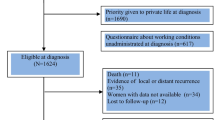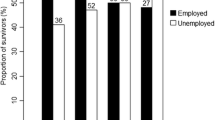Abstract
Purpose
The purpose of this study is to investigate how women, during the 2 years following breast cancer surgery, rate importance of work and vocational satisfaction, and baseline factors associated with rating over time.
Methods
A prospective cohort study of 692 women aged 20–63 included about 4 weeks after a first breast cancer surgery. Register data on treatment and data from six repeated questionnaires during a 2-year follow-up (at baseline, 4, 8, 12, 18, 24 months) were used in two-way mixed repeated analysis of variance and mixed repeated measures analysis of covariance.
Results
The women rated importance of work (m = 3.74; sd 0.88) (maximum 5) and vocational satisfaction (m = 4.30; sd 1.38) (maximum 6) high during the 2 years. Women with planned chemotherapy rated lower vocational satisfaction and especially so at 4 months after inclusion (F 1, 498 = 8.20; p = 0.004). Higher age, better physical, and mental/social work ability at baseline influenced rating of vocational satisfaction. Supportive colleagues was an important covariate that significantly affected ratings of importance of work as well as vocational satisfaction, i.e., women with better support rated on average higher on these outcomes. The effect of chemotherapy disappeared after including the abovementioned baseline covariates.
Conclusions
Women diagnosed with breast cancer in the following 2 years rate importance of work and vocational satisfaction high, which are associated to lower work ability and social support.
Implications for cancer survivors
Work is a very important aspect in life also after a cancer diagnosis, which has to be acknowledged when discussing treatment and rehabilitation plans with women with breast cancer. Furthermore, workplace support needs to be assessed as this is an influential factor.






Similar content being viewed by others
References
Lilliehorn S, Hamberg K, Kero A, Salander P. Meaning of work and the returning process after breast cancer: a longitudinal study of 56 women. Scand J Caring Sci. 2013;27(2):267–74. doi:10.1111/j.1471-6712.2012.01026.x.
Maunsell E, Drolet M, Brisson J, Brisson C, Masse B, Deschenes L. Work situation after breast cancer: results from a population-based study. J Natl Cancer Inst. 2004;96(24):1813–22.
Johnsson A, Fornander T, Rutqvist LE, Olsson M. Factors influencing return to work: a narrative study of women treated for breast cancer. Eur J Cancer Care. 2010;19(3):317–23.
Høyer M, Nordin K, Ahlgren J, Bergkvist L, Lambe M, Johansson B, et al. Change in working time in a population-based cohort of patients with breast cancer. J Clin Oncol: Off J Am Soc Clin Oncol. 2012;30(23):2853–60. doi:10.1200/jco.2011.41.4375.
Johnsson A, Fornander T, Rutqvist LE, Vaez M, Alexanderson K, Olsson M. Predictors of return to work ten months after primary breast cancer surgery. Acta Oncol. 2009;48(1):93–8.
Petersson LM, Nilsson MI, Alexanderson K, Olsson M, Wennman-Larsen A. How do women value work shortly after breast cancer surgery and are their valuations associated with being on sick leave? J Occup Rehabil. 2013;23(3):391–9. doi:10.1007/s10926-012-9402-0.
Barnes AJ, Robert N, Bradley CJ. Job attributes, job satisfaction and the return to health after breast cancer diagnosis and treatment. Psycho-Oncology. 2014;23(2):158–64. doi:10.1002/pon.3385.
Clausen T, Christensen KB, Borg V. Positive work-related states and long-term sickness absence: a study of register-based outcomes. Scand J Public Health. 2010;38(3 Suppl):51–8. doi:10.1177/1403494809352105.
Clausen T, Friis Andersen M, Christensen KB, Lund T. Return to work among employees with long-term sickness absence in eldercare: a prospective analysis of register-based outcomes. Int J Rehabil Res. 2011;34(3):249–54. doi:10.1097/MRR.0b013e328348b171.
Johnsson A, Fornander T, Rutqvist LE, Olsson M. Work status and life changes in the first year after breast cancer diagnosis. Work. 2011;38(4):337–46. doi:10.3233/WOR-2011-1137.
Jahoda M. Work, employment and unemployment. Values, theories and approaches in social research. Am Psychol. 1981;36(2):184–91.
Waddell G, Burton K. Is work good for your health and well-being? London: TSO; 2006.
Ebenhan K, Leuteritz K, Barthel Y, Beutel ME, Papsdorf K, Weissflog G, et al. Children and employment—resource or stressors after breast cancer? Geburtshilfe Frauenheilkd. 2013;73(8):792–9. doi:10.1055/s-0033-1350704.
Mehnert A, de Boer A, Feuerstein M. Employment challenges for cancer survivors. Cancer. 2013;119 Suppl 11:2151–9. doi:10.1002/cncr.28067.
Naus MJ, Rasch RL, Spitzmueller C, Bussell VA. Cancer survivors at work: job satisfaction at different phases of survivorship. Ann Behav Med. 2007;33:S56.
Mehnert A, Koch U. Work satisfaction and quality of life in cancer survivors in the first year after oncological rehabilitation. Work. 2013;46(4):407–15. doi:10.3233/WOR-131676.
Petersson L-M, Wennman-Larsen A, Nilsson M, Olsson M, Alexanderson K. Work situation and sickness absence in the initial period after breast cancer surgery. Acta Oncol. 2011;50(2):282–8. doi:10.3109/0284186X.2010.533191.
Saboonchi F, Petersson LM, Wennman-Larsen A, Alexanderson K, Brannstrom R, Vaez M. Changes in caseness of anxiety and depression in breast cancer patients during the first year following surgery: patterns of transiency and severity of the distress response. Eur J Oncol Nurs: Off J Eur Oncol Nurs Soc. 2014;18(6):598–604. doi:10.1016/j.ejon.2014.06.007.
Wennman-Larsen A, Petersson LM, Saboonchi F, Alexanderson K, Vaez M. Consistency of breast and arm symptoms during the first two years after breast cancer surgery. Oncol Nurs Forum. 2015;42(2):145–55. doi:10.1188/15.ONF.145-155.
Emilsson L, Lindahl B, Koster M, Lambe M, Ludvigsson JF. Review of 103 Swedish healthcare quality registries. J Intern Med. 2015;277(1):94–136. doi:10.1111/joim.12303.
Dallner M, Gamberale F, Olsson A, Örelius D. Testing of a co-nordic questionnaire on psychological and social factors in work life, QPS Nordic: National Institutet for Working Life (Arbetslivsinstitutet)1999. Report No.: 1999:14.
Fugl-Meyer AR, Eklund M, Fugl-Meyer KS. Vocational rehabilitation in northern Sweden. III. Aspects of life satisfaction. Scand J Rehabil Med. 1991;23(2):83–7.
Hallin A, Bergqvist D, Fugl-Meyer K, Holmberg L. Areas of concern, quality of life and life satisfaction in patients with peripheral vascular disease. Eur J Vasc Endovasc Surg. 2002;24(3):255–63.
Eriksson G, Kottorp A, Borg J, Tham K. Relationship between occupational gaps in everyday life, depressive mood and life satisfaction after acquired brain injury. J Rehabil Med: Off J UEMS Eur Board Phys Rehabil Med. 2009;41(3):187–94. doi:10.2340/16501977-0307.
Tuomi K, Ilmarinen J, Jahkola A, Katajarinne L, Tulkki A. Work ability index. Helsinki: Finnish Institute of Occupational Health; 1998.
Arbetslivkohorten - Teknisk rapport 1 2005:8 (National Working Life Cohort—technical report 1) [in Swedish]. In: Arbetslivsrapport. National Institute for Working Life, Stockholm. 2005. Nile..lub.lu.se/arbarch/arb/2005/arb2005_08.pdf.
Lampic C, Thurfjell E, Bergh J, Carlsson M, Sjoden PO. Life values before versus after a breast cancer diagnosis. Res Nurs Health. 2002;25(2):89–98.
Wells M, Williams B, Firnigl D, Lang H, Coyle J, Kroll T, et al. Supporting ‘work-related goals’ rather than ‘return to work’ after cancer? A systematic review and meta-synthesis of 25 qualitative studies. Psycho-Oncology. 2013;22(6):1208–19. doi:10.1002/pon.3148.
Nilsson MI, Olsson M, Wennman-Larsen A, Petersson LM, Alexanderson K. Women’s reflections and actions regarding working after breast cancer surgery—a focus group study. Psycho-Oncology. 2013;22(7):1639–44. doi:10.1002/pon.3192.
Hakanen JJ, Lindbohm ML. Work engagement among breast cancer survivors and the referents: the importance of optimism and social resources at work. J Cancer Surviv: Res Pract. 2008;2(4):283–95. doi:10.1007/s11764-008-0071-0.
Skånér Y, Nilsson G, Arrelöv B, Lindholm C, Hinas E, Löfgren A, et al. Use and usefulness of guidelines for sickness certification: results from a national survey of all general practitioners in Sweden. BMJ Open. 2011;1(2):e000303. doi:10.1136/bmjopen-2011-000303.
Denieffe S, Gooney M. A meta-synthesis of women’s symptoms experience and breast cancer. Eur J Cancer Care. 2011;20(4):424–35. doi:10.1111/j.1365-2354.2010.01223.x.
Janz NK, Mujahid M, Chung LK, Lantz PM, Hawley ST, Morrow M, et al. Symptom experience and quality of life of women following breast cancer treatment. J Womens’s Health. 2007;16(9):1348–61.
Hutchinson AD, Hosking JR, Kichenadasse G, Mattiske JK, Wilson C. Objective and subjective cognitive impairment following chemotherapy for cancer: a systematic review. Cancer Treat Rev. 2012;38(7):926–34. doi:10.1016/j.ctrv.2012.05.002.
Howard-Anderson J, Ganz PA, Bower JE, Stanton AL. Quality of life, fertility concerns, and behavioral health outcomes in younger breast cancer survivors: a systematic review. J Natl Cancer Inst. 2012;104(5):386–405. doi:10.1093/jnci/djr541.
Zainal NZ, Nik-Jaafar NR, Baharudin A, Sabki ZA, Ng CG. Prevalence of depression in breast cancer survivors: a systematic review of observational studies. Asian Pac J Cancer Prev. 2013;14(4):2649–56.
Ono M, Ogilvie JM, Wilson JS, Green H, Chambers SK, Ownsworth T et al. A meta-analysis of cognitive impairment and decline associated with adjuvant chemotherapy in women with breast cancer. Front Oncol. 2015;5. doi:10.3389/fonc.2015.00059.
Arora NK, Finney Rutten LJ, Gustafson DH, Moser R, Hawkins RP. Perceived helpfulness and impact of social support provided by family, friends, and health care providers to women newly diagnosed with breast cancer. Psycho-Oncology. 2007;16(5):474–86.
Acknowledgments
The study was funded by the Swedish Research Council, the Swedish Cancer Society, the Cancer Research Foundations of Radiumhemmet, and the Swedish Research Council for Health, Working Life and Welfare.
Author information
Authors and Affiliations
Corresponding author
Ethics declarations
Conflict of interest
The authors declare that they have no competing interests.
Ethical approval
The study was approved by the Regional Ethical Review Board in Stockholm, Sweden. All procedures performed in studies involving human participants were in accordance with the ethical standards of the regional research committee and with the 1967 Helsinki Declaration and its later amendments or comparable ethical standards. Informed consent was obtained from all individual participants included in the study.
Rights and permissions
About this article
Cite this article
Nilsson, M.I., Saboonchi, F., Alexanderson, K. et al. Changes in importance of work and vocational satisfaction during the 2 years after breast cancer surgery and factors associated with this. J Cancer Surviv 10, 564–572 (2016). https://doi.org/10.1007/s11764-015-0502-7
Received:
Accepted:
Published:
Issue Date:
DOI: https://doi.org/10.1007/s11764-015-0502-7




